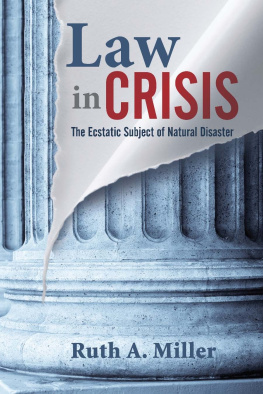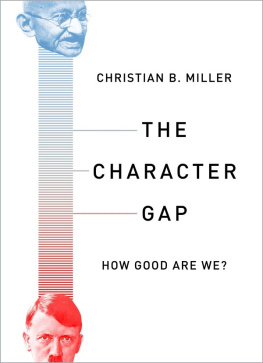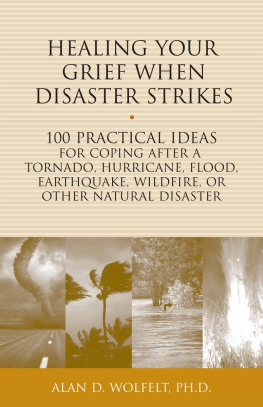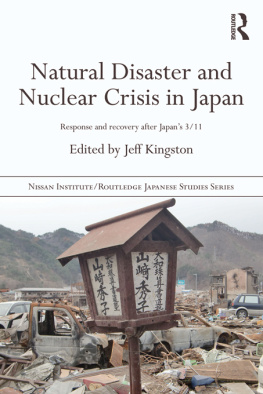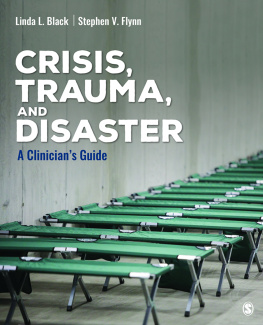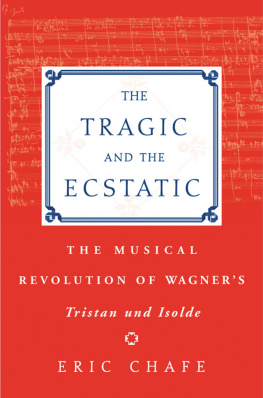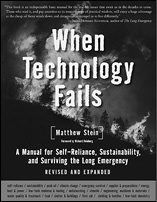Miller - Law in crisis: the ecstatic subject of natural disaster
Here you can read online Miller - Law in crisis: the ecstatic subject of natural disaster full text of the book (entire story) in english for free. Download pdf and epub, get meaning, cover and reviews about this ebook. City: Stanford;Calif, year: 2009;2013, publisher: Stanford University Press, genre: Romance novel. Description of the work, (preface) as well as reviews are available. Best literature library LitArk.com created for fans of good reading and offers a wide selection of genres:
Romance novel
Science fiction
Adventure
Detective
Science
History
Home and family
Prose
Art
Politics
Computer
Non-fiction
Religion
Business
Children
Humor
Choose a favorite category and find really read worthwhile books. Enjoy immersion in the world of imagination, feel the emotions of the characters or learn something new for yourself, make an fascinating discovery.
- Book:Law in crisis: the ecstatic subject of natural disaster
- Author:
- Publisher:Stanford University Press
- Genre:
- Year:2009;2013
- City:Stanford;Calif
- Rating:4 / 5
- Favourites:Add to favourites
- Your mark:
- 80
- 1
- 2
- 3
- 4
- 5
Law in crisis: the ecstatic subject of natural disaster: summary, description and annotation
We offer to read an annotation, description, summary or preface (depends on what the author of the book "Law in crisis: the ecstatic subject of natural disaster" wrote himself). If you haven't found the necessary information about the book — write in the comments, we will try to find it.
Law in crisis: the ecstatic subject of natural disaster — read online for free the complete book (whole text) full work
Below is the text of the book, divided by pages. System saving the place of the last page read, allows you to conveniently read the book "Law in crisis: the ecstatic subject of natural disaster" online for free, without having to search again every time where you left off. Put a bookmark, and you can go to the page where you finished reading at any time.
Font size:
Interval:
Bookmark:
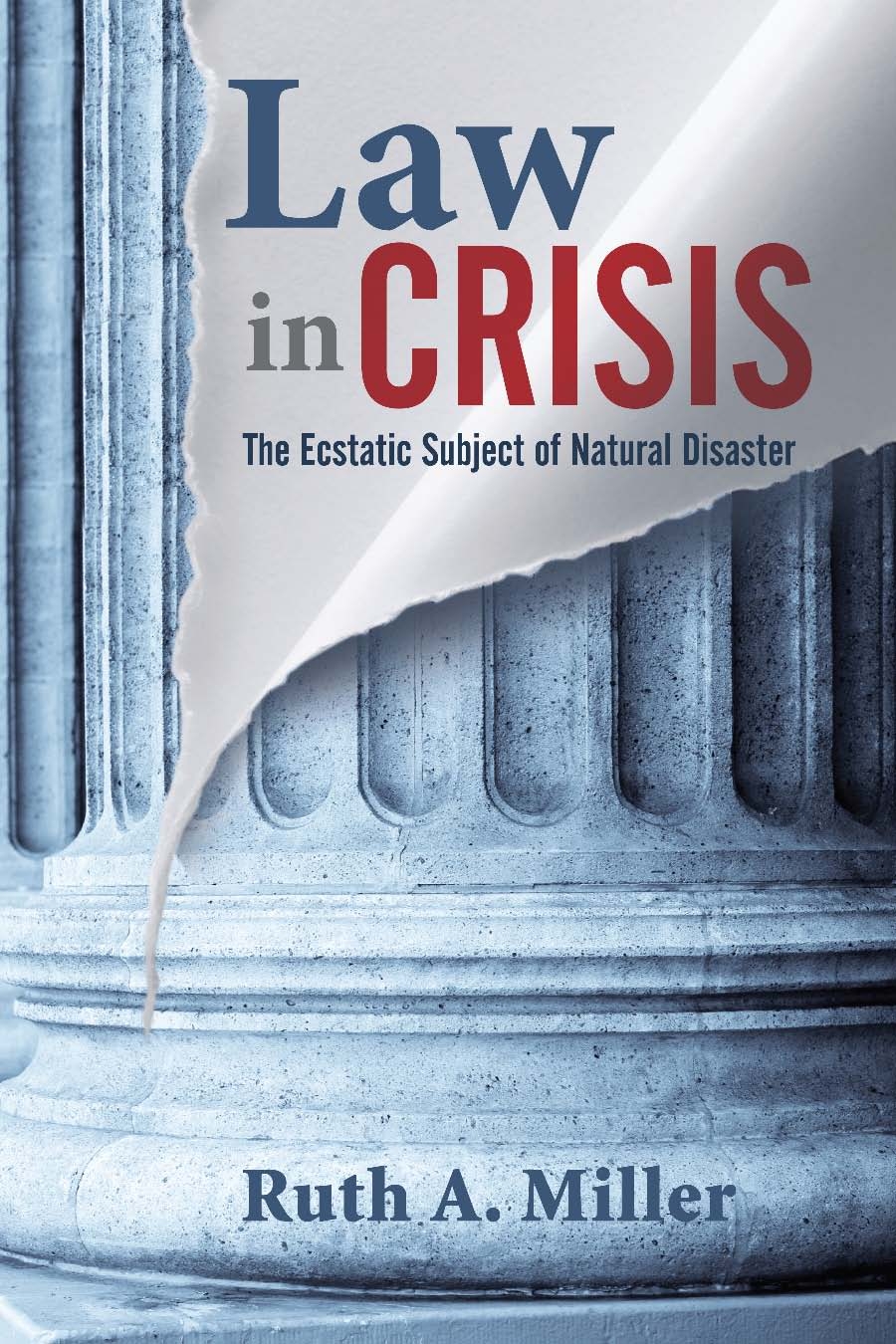
Unless otherwise noted, all translations are my own.
See, for instance, the extensive analysis of ecstasy in Judith Butler, Undoing Gender . New York and London: Routledge, 2004. pp. 1921, 3233, 148151.
See, among others, Andrew M. Greeley, Ecstasy: A Way of Knowing . Englewood Cliffs, N.J.: Prentice-Hall, 1974; Carl W. Ernst, Words of Ecstasy in Sufism . Albany: State University of New York Press, 1985; James Rolleston, Narratives of Ecstasy: Romantic Temporality in Modern German Poetry . Detroit: Wayne State University Press, 1987; Felicitas D. Goodman, Ecstasy, Ritual, and Alternate Reality: Religion in a Pluralistic World . Bloomington: Indiana University Press, 1988; John J. Collins and Michael Fishbane, eds., Death, Ecstasy, and Other Worldly Journeys . Albany: State University of New York Press, 1995; Jill Marsden, After Nietzsche: Notes Towards a Philosophy of Ecstasy . New York: Palgrave, 2002.
Although this idea was a common theme among classical Greek, Roman, and medieval thinkers. See Ecstasy and Subjectivity in this chapter..
As in Daniel A. Farber and Jim Chen, Disasters and the Law: Katrina and Beyond . New York: Aspen Publishers, 2006.
As Nikolas Rose, Pat OMalley, and Mariana Valverde argue in their discussion of Foucaults theories of governmentality, the intrinsic relationship between government and ethics linked Foucaults arguments into the lively debates at that time [the early 1980s] concerning the question of the subject. During the 1970s, many had argued that the constitution of subjectivity was a key political issue; that capitalism required the production of subjects who imagined themselves to be autonomous, self-possessed, bounded, agentive individuals; and that radical thought needed to question this imaginary relation through semiotics or through a certain version of (French) psychoanalysis. Nikolas Rose, Pat OMalley, and Mariana Valverde, Governmentality, Annual Review of Law and Social Science 2 (2006): 83104. p. 90.
Antony Anghie, Finding the Peripheries: Sovereignty and Colonialism in Nineteenth Century International Law, Harvard International Law Journal 40 (1999): 180. p. 27.
Hannah Arendt, The Origins of Totalitarianism . New York: Harcourt, 1976. p. 300.
For instance, Butler, Undoing , pp. 3134.
See the discussion of bodily integrity and national boundaries in Luise White, The Traffic in Heads: Bodies, Borders, and the Articulation of Regional Histories, Journal of South African Studies 23 (3) (1997): 325338. pp. 326, 332.
Although a number of scholars writing from a psychoanalytical framework have noted the paradoxical nature of subjectivity in legal thought. David Caudill, for example, has made the convincing case that Lacanian analysis might be an effective way to address the complexity of the legal subject. (David Caudill, Lacan and the Subject of Law: Toward a Psychoanalytical Critical Legal Theory . Atlantic Highlands, N.J.: Humanities Press, 1997.) It is worth pointing out, however, that Caudill likewise recognizes the relative paucity of sustained work on shattered, multiple, or shifting subjects of law. In his discussion of Pierre Schlag, for instancea scholar who has addressed the problematic nature of legal subjectivity in some detailCaudill notes that there is some ambiguity in Schlags use of the term self. The rational, autonomous self is a rhetorical fiction in the form of American legal thought... [I]n Schlags treatment of these paradoxes, he is more philosophical than he is psychological, more oriented to text as psyche than to psyche as text, and more attuned to social than psychoanalytical theory. Caudill, p. 72. Schlag does nonetheless provide an excellent foundation for many of the ideas that I explore in my own (also more philosophical than psychoanalytical) approach to legal subjectivity. See Pierre Schlag, The Problem of the Subject, Texas Law Review 69 (1991): 16271743.
As it is defined in Carl Schmitt, Political Theology: Four Chapters on the Concept of Sovereignty . Trans. George Schwab. Chicago: University of Chicago Press, 2005. p. 12.
See Giorgio Agamben, State of Exception . Trans. Kevin Attell. Chicago: University of Chicago Press, 2005. In this way, the impossible task of welding norm and reality together, and thereby constituting the normal sphere, is carried out in the form of the exception, that is to say, by presupposing their nexus. This means that in order to apply a norm it is ultimately necessary to suspend its application, to produce an exception. p. 40.
My hope is that this introductory summary of the state of ecstasy will serve as a foundation for the more detailed analysis of the ecstatic subject that comes next. Moreover, to the extent that this book describes the ways in which legal ecstasy defines ecstatic subjectsrather than the ways in which subjects in ecstasy define ecstatic lawI think it is useful to attempt to theorize, at least, a state of ecstasy that exists prior to subjectivity.
See, for example, Judith Butlers analysis of ecstasy in the work of Hegel and Benjamin : In my view, Hegel has given us an ek-static notion of the self, one which is, of necessity, outside itself, not self-identical, differentiated from the start... [T]o be a self is, on these terms, to be at a distance from who one is, not to enjoy the prerogative of self-identity (what Hegel calls self-certainty), but to be cast, always, outside oneself, Other to oneself. Butler, Undoing , p. 148.
I should emphasize that Butler is at pains to differentiate between the self and the subject in these passages: the self here is not the same as the subject, which is a conceit of autonomous self-determination. The self in Hegel is marked by a primary enthrallment with the Other, one in which that self is put at risk. Butler, Undoing , p. 149. This differentiation is key to my argument as well, and I address it in more detail in the section that follows. For more on the difference between the subject and the self in psychoanalytical theory, see Henrietta Moore, Divided We Stand: Sex, Gender, and Sexual Difference, Feminist Review 47 (Summer, 1994): 7895, where Moore notes that the Lacanian subject should not be confused either with the person or the self. p. 92.
As, for example, Pheng Cheah describes each in the work of Kant and Hegel. Pheng Cheah, Spectral Nationality: Passages of Freedom from Kant to Postcolonial Literatures of Liberation . New York: Columbia University Press, 2003. pp. 151152.
See, for example, Rosi Braidotti, Patterns of Dissonance: A Study of Women in Contemporary Philosophy . Trans. Elizabeth Guild. New York: Routledge, 1991. p. 52. For a defense or reimagining of the Cartesian subject, see Slavoj Zizek, The Ticklish Subject: The Absent Centre of Political Ontology . London: Verso, 1999.
And in which the universality of the knowing thing and the processes of knowing rendered this Cartesian subject a transcendental one. Matthew L. Jones, Descartes Geometry as Spiritual Exercise, Critical Inquiry 28 (1) (Autumn, 2001): 4071. pp. 4041.
For example, [Descartes] continually asserted that mathematics is an exercise, perhaps the best that we have. In taking this claim seriously, we can clarify Descartes geometry. Simultaneously we will escape the long tradition of equating the subject Descartes aimed to create through his exercise with the so-called Cartesian and modern subjects. Jones, p. 46.
Ibid, p. 42.
Ibid, p. 53. Italics in original.
Longinus, On the Sublime . Trans. James A. Arieti and John M. Grossett. New York: Edwin Mellen Press, 1985. p. 6 [1.2].
Font size:
Interval:
Bookmark:
Similar books «Law in crisis: the ecstatic subject of natural disaster»
Look at similar books to Law in crisis: the ecstatic subject of natural disaster. We have selected literature similar in name and meaning in the hope of providing readers with more options to find new, interesting, not yet read works.
Discussion, reviews of the book Law in crisis: the ecstatic subject of natural disaster and just readers' own opinions. Leave your comments, write what you think about the work, its meaning or the main characters. Specify what exactly you liked and what you didn't like, and why you think so.

